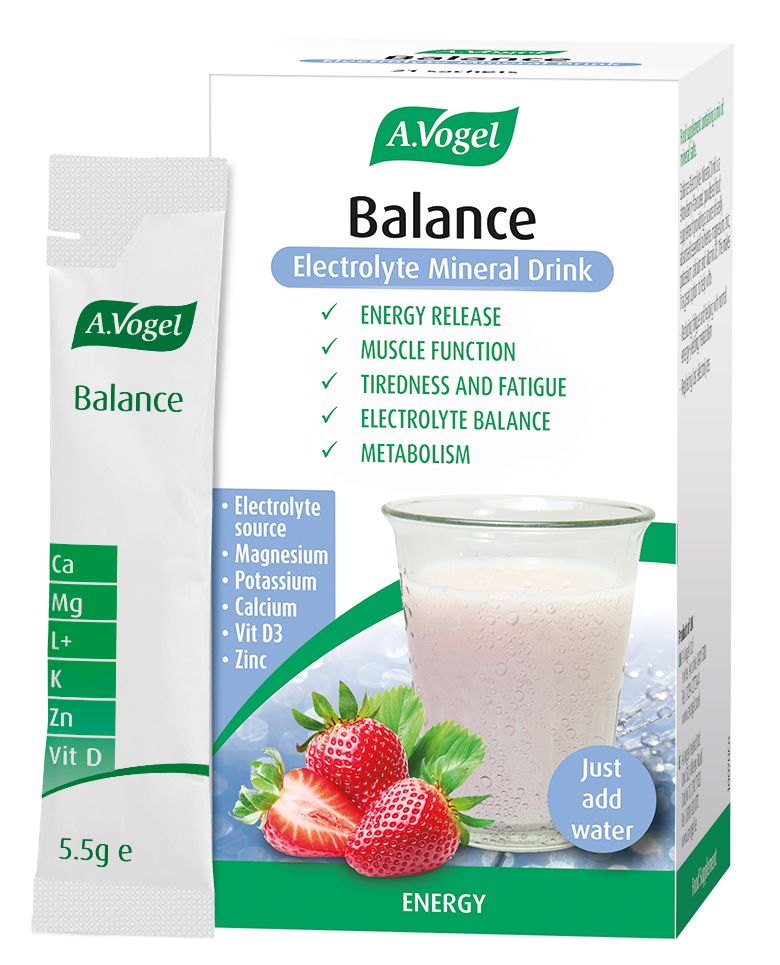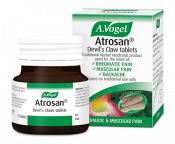What causes muscle cramps?
Muscle cramps occur when the muscles shorten and tighten. It is most common to get muscle cramps at night, though they can occur at any time. Various factors can contribute to muscle cramps, such as:
- Magnesium deficiency
- Activity levels
- Aging
- Dehydration
- Pregnancy
- Alcohol
- Medication
Let's find out more about why these things may contribute to muscle cramps.
1. Magnesium deficiency
Magnesium is important for the health of the muscles and joints but, more specifically, it helps the muscles expand and contract. Therefore, if our diet fails to provide enough magnesium, we may be more prone to muscle cramps.
Magnesium deficiency is common in western diets because of a reliance on processed foods, rather than freshly cooked meals and snacks. Eating plenty of fresh ingredients, on the other hand, makes it less likely you'll become deficient in magnesium.
A.Vogel Balance Electrolyte Mineral Drink with Vitamin D3, Magnesium, Zinc, Potassium and Calcium.
£22.49 (21 x 5.5g sachets) In Stock
2. Activity
Exercise can sometimes contribute to cramp because it puts the muscles under strain it isn't used to. Cramps that are the result of activity usually ease off after a couple of days, at most. In the meantime, having relaxing hot baths and doing some gentle stretches should provide some relief.
3. Aging
Unfortunately, age can increase the incidence of muscle cramps.1 The exact reason for this isn't entirely clear, though the problem has been linked with medication and certain conditions.
Menopausal women are particularly prone to muscle cramps. At this time, oestrogen levels fall, which can affect the uptake of magnesium. In turn, lower magnesium levels can contribute to muscle pain and cramps.
As oestrogen levels fall in the week or so before your period, this may also explain why women are more prone to cramps in the run-up to their period.
4. Dehydration
Good hydration levels enable the muscles to expand and contract efficiently. Failing to drink enough water is a major problem and can contribute to muscle cramp.
Muscle cramps caused by dehydration are most common after exercising, when the weather is hot or after an illness. In all of these instances, we lose lots of water and so we have to make a conscious effort to re-hydrate.
5. Pregnancy
In the later stages of pregnancy, women may be more likely to experience muscle cramps. There are several possible reasons for this, including nutrient deficiency and lack of exercise. It could also be caused by poor circulation due to the baby pressing on certain nerves or blood vessels.
6. Alcohol
High alcohol consumption may be a cause of muscle cramps. The most obvious reason for this is that it drains magnesium from the body, however, it can also lead to liver disease which can contribute to these kinds of symptoms.
Too much alcohol can also lead to a problem known as alcohol neuropathy where the nerves are damaged, leading to cramps, muscle weakness and more. The same kind of symptoms can result from alcohol myopathy, which affects muscle fibers.
In all of these cases, a doctor should be consulted.
7. Medication
Medications including statins are widely known to have side effects which include pain and cramps in the muscles and joints. Again, in this case, it is advisable to speak to your doctor, whilst also following some of the tips that I have outlined below.
How can I prevent muscle cramps?
Now, if you experience muscle cramps, there are a few things I would suggest to help reduce the problem.
Get some more magnesium - magnesium deficiency can contribute to muscle cramps, so you may find that it helps to increase your intake of magnesium-rich foods such as spinach, nuts and seeds. Our Balance Mineral Drink also contains a little magnesium and helps to support the muscles and joints so this may be a helpful addition.
Drink more water - I'd suggest tracking the amount of water you are drinking – plain water, not anything fizzy, flavoured or teas/coffee. You need at least 1.5 litres daily and more in hot weather. Without sufficient hydration, you will be far more prone to cramps.
Apply a herbal remedy - You can apply Venagel before going to bed and again if you wake in the night. However, this is just for temporary relief rather than correcting the underlying situation.
Massage – next time you experience cramps, try massaging the area gently to help ease the discomfort.
Stretch – gentle stretching may help to ease cramps further. Check out our blog 'Easy stretches to do at your desk' for suggestions.
If these natural and lifestyle changes do not improve your symptoms, it is important to see your doctor to help work out the root cause of your cramps and the best treatment options. There are a few instances when you should see a doctor more quickly:
- If cramp is disturbing your sleep
- Cramp lasts for more than 10 minutes at a time
- Swelling or numbness accompanies cramp.
References
1 https://academic.oup.com/ageing/article-abstract/23/5/418/26543









